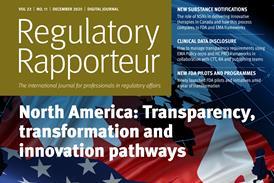Such significant advances in information management and technology are providing us with sophisticated tools and new ways of working
After more than two years of limited travel and being thrown into the midst of finding new ways of communicating, we hope that you are enjoying summer 2022, with what is now starting to feel like a return to pre-2020 normality. In-person international conferences are back on the agenda for many and bring a welcome opportunity to reacquaint with colleagues, make new friends and most importantly, sit back and digest the exciting data emerging from the tremendous work ongoing in our industry.
Data governance is the focus topic for this month’s issue. The concept of having oversight and control of data, especially in an era of advancing technology, remains one of the hottest topics in our regulatory a airs discipline and is a key focus for our industry. Putting appropriate systems and processes in place to systemically improve data quality has and continues to evolve with increasing pace, importance and prioritisation. Any concerns with data reliability can lead to the rejection of data used in regulatory submissions. Therefore, investment and attention to this area and embracing it as part of a company’s quality culture is crucial, especially given the speed of technological advancement. Such significant advances in information management and technology are providing us with sophisticated tools and new ways of working.
Our opening focus article, authored by Nancy Pire-Smerkanich, sets the scene and cadence on data governance as a “multi-faceted arrangement that relies on data quality, data integrity, data and document management, and security and safe storage.” She outlines data governance concepts and their origins. Our interview with Dr Hilmar Hamann, Head of Information Management Division at the EMA, enables us an insight into information management at the Agency as he discusses the challenges faced and the Agency’s long-term visions for information management. Similarly in the data governance arena, Timm Pauli and Torsten Osthus discuss how companies want to take advantage of digital innovations to become data-driven organisations, but to do so they must overcome various data challenges to move from concept to execution.
This month’s issue also includes a diverse range of standalone topics. Giovanni Campana outlines helpful and hands-on experience over a one-year period since the introduction of the EU Medical Devices Regulation (MDR) 2017/745. Specifically, he focuses on Article 117 of the MDR which asks for a notified body opinion to be included in the marketing authorisation applications for medicinal products being a single integral drug-device.
In context with the running theme of evolving technology, Satish Muchakayala discusses how novel technologies can help overcome the global health threat of antimicrobial resistance.
In part 1 of a two-part MSc dissertation, Sarah Laird investigates the barriers and challenges that exist for industry in the Rx to OTC switch framework and how these hurdles might be overcome.
A key skill for professionals working in regulatory affairs is knowing how to successfully navigate global regulatory agency meetings and interactions. As one becomes more senior in one’s career, this skill is typically finessed with practical experience. As our final piece in this issue, we include a CPD supplement authored by Danielle Helton Corwin and Daniela Drago. The authors offer useful and practical tips on how to hold a successful regulatory agency meeting across the drug development lifecycle with the FDA. Finally, we hope you enjoy some well-deserved downtime over the summer months with family and friends and perhaps even take Regulatory Rapporteur with you as a pool-side read!





































